Welcome back to the blog. I have an announcement.
First off, I once again want to thank everyone who has purchased my book. I never expected such a positive response, and it makes everything feel more worthwhile 🙂
Secondly, I want to announce that I now have a Ko-Fi page. About a year ago, I took down my PayPal donation page, due to various problems I had with that platform. Some people have asked if they can donate elsewhere. So now you can. If you wish to support the blog, you can do so at my Ko-Fi page. Go to https://ko-fi.com/whiteraveninvictus
Every bit helps, so thank you in advance!
Anyway, with that out of the way, let’s get to today’s post. This post is the second part to the Great Secret of Magick, and the first part can be found here.
Magick Generates Culture
It has generally been my firm belief that all societies and civilisations have two fundamental pillars (yes, yes, make all your jokes now). Namely, these are Science, and Culture. Objective and Subjective. One comes from looking out into the world, and the other from looking within.
In the previous post, we discussed how Science essentially results from the Occult. The Occult means ‘Unknown’ and an Occultist is one who encounters the Unknown. Doing so, they begin to experience, comprehend and learn about new things, which slowly assimilate to the greater pool of human understanding.
Indeed, the ancient Shaman was the one who left the safety of the village and ventured into the unknown forest to find strange herbs that could heal illnesses. Over centuries, of course, the sphere of the ‘Known’ would continue to grow, and that which was ‘Unknown’ would recede further and further. There would come a day when the modern biologist knew all about the healing plant, where it grew, how it worked, and probably knew how to manufacture the essential components in a lab.
But the world as within is reflected in the world without. When the shaman ventured into the forest, he did not merely encounter the Unknown in the world outside, but also in the world within.
You see, our brain has two hemispheres, the left and the right. The Left brain deals with all that is ‘known’ and is generally the active side helping us deal with our daily life and mundane tasks. It is more logical and methodical, since everything we do is logical and methodical. We may think we decide things on the spur of the moment, but the subconscious really decides this stuff long in advance, generally focusing on whatever is best for the individual.
The Right brain rules the ‘unknown’. It is far more fluid, and contains exploratory circuits. When you encounter something that is new, unexpected or not understood, your Right brain instantly activates. You feel anxiety, fear, anticipation and excitement, as your brain attempts to learn and understand this new phenomena. In other words, your brain literally grows when you encounter the Unknown.
So, when the shaman went into the forest, he wasn’t just mapping the forest, but also his inner world of his own consciousness. The Shaman was learning where to find the medicinal herbs, but he was also overcoming his own fears, learning about his own feelings, challenging his own beliefs and expanding his own knowledge. He was growing, and evolving. The more he evolved as a person, the more attuned he become with Spirit, which is that inner light in every individual. Perhaps sitting in the darkness, away from people, in a place he did not understand, he could enter into a trance, where he saw the contents of his mind projected. By eating and testing the herbs to find those which were medicinal, he was undertaking a great act of courage, and a trial which would kill him. He had to have faith in his Gods, and hoped that he made the right decision.

Thus, when the Shaman returned to the village, he hadn’t just brought medicine, he had transformed into something else, closer to the Gods. He had fundamentally changed, and would change each time such journeys were undertaken. And his disciples would continue the work, generation after generation, taking the light into the darkness, and bring expand the Order into the Chaos. The spiritual transformation they underwent is not accessible to the average student of biology who simply reads about these herbs in a textbook or experiments on them in a controlled setting, knowing the result. But even this biologist, should he choose to boldly encounter the Unknown, would undergo this change. The Occult transformation. This is what it means to be an ‘occultist’.
Now, the Shaman did not merely live off in the forest collecting herbs. His considerable wisdom, spiritual inclination and self knowledge made him a source of understanding for all those in his village. People looked to him for guidance, and to make sense of things. The shaman told the people how to commune with the Gods, how to prepare and consume the herbs. Perhaps he made it all into a little ritual, which could be remembered and easily followed. Maybe the herbs were blue, and so blue became a colour associated with that tribe, and its healing ritual.
This then extends beyond just herbs, into various other categories. Shamans, mystics, witches, monks, all become symbols of encountering the Unknown. In a sense, by doing so, they themselves come to represent the Unknown.
There’s many stories of witches and wizards being strange folk, and in a way the stories of these figures themselves represent the Unknown to common people living within the mundane. For while some people are meant to go forth on the magickal path, everyone needs spirituality to live a good life. Yes, the shaman may go into the forest to gather the herb, but what of others who shall never make such exciting journeys? How will they get closer to Spirit?
The stories of the shaman going to gather the herb will be told to little children, and it will fill them with fascination. As adults the herb, and the ritual associated with it, becomes an object of worship and communion. The legacy of the shaman’s journey becomes a way for ordinary people to have their own little encounter, in their own unique ways. Maybe it even gets codified, and perhaps even exaggerated. Maybe the story tells of how the Shaman stole the herb from an evil monster that lives in the forest, and maybe this story also encourages young children not to run off into the forest. The ‘monster’, of course, is another psychic projection into the Unknown, representing the fear and awe of the people.
This process continues for thousands and thousands of years. Even hundreds of thousands of years, and this is how ‘culture’ comes to be. After all, what even is culture? It is simply a society’s collective expression. Food, language, arts, philosophies, social values, religion etc. But these things didn’t just spawn out of nowhere. They are the result of that society, and its magicians, slowly expanding the sphere of that which is Known. It represents their unique perspective of the life and the world, and their answer to the ancient question: What is our purpose?
You would actually be surprised just how important a role occultists play in the generation of culture. A lot of the things you think just came around naturally, like religion, philosophy and language, can actually be traced back to such individuals. They are the ones who first push the boundaries, and then the rest follow. For example, it was the shaman who first went into the forest to find the medicinal herbs. Yes, after that initial journey, countless others will follow in his footsteps, slowly expanding their knowledge and understanding. Thousands of years later, their medical understanding may be very advanced, far ahead of their shamanic ancestor. But without him taking the brave journey into the Unknown, none of it would have come to pass.
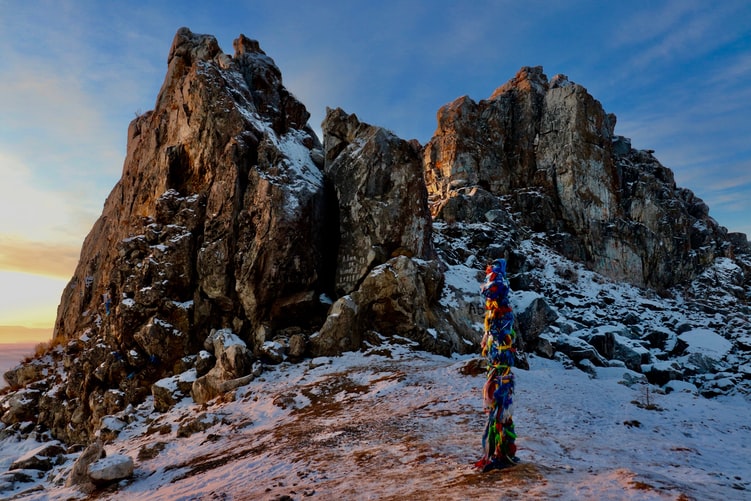
Thus, Culture is what is ‘Known’. It is the Order that was born out of Chaos, which is the Unknown, and that is the realm of Nature. This bringing forth of Order from Chaos, is nothing but magick! It is the work of occultists. And this Culture provides stability, security and peace to the common folk, who celebrate it, revere it, and use it to make sense of life and the world.
Religion becomes a bridge between the Unknown and the Known. It celebrates the magicians, witches and wizards who came before, and enshrines their wisdom. By partaking in religious ceremonies and studying scripture, it allows the common folk to have a window into the experiences of these magicians, allowing them to also know themselves a little better. They may not undertake the journey into the Unknown, but at least they can find peace within themselves.
Culture: The Divine Father
Let me ask you a question: who, or what, is ‘God’.
No, I’m not talking about deities. Nor am I talking about angels, demons, spirits, or the abrahamic deity.
What do we really mean when we say ‘God’. Well, in a sense, you could say it is the Highest Ideal.
By the way, I should warn you that this is going to a particularly convoluted post. Took me nearly 5 years of my life to properly wrap my mind around this branch of philosophy, and even longer to see how it was important in magick.
Every individual, subconsciously, carries a moral compass. Basically, inside our heads is a hierarchy of values, where all of our values are ranked based on how important they are to us. In a sense, these help us determine what is ‘good’ and ‘bad’. ‘God’ can be said to be the Highest ideal, which means the ‘meta-value’. The value that is used to determine other values.
Let me be clear that most people will never become conscious of their inner values, but they will act them out, unconsciously. These values are not based on the laws and social norms of a society, although they may be affected by them. To those of you who understand the Kabbalistic Tree of Life, think of this value hierarchy being placed in the Sephirah of Chesed, and Da’ath being the place of the Highest Ideal, ie ‘God’.
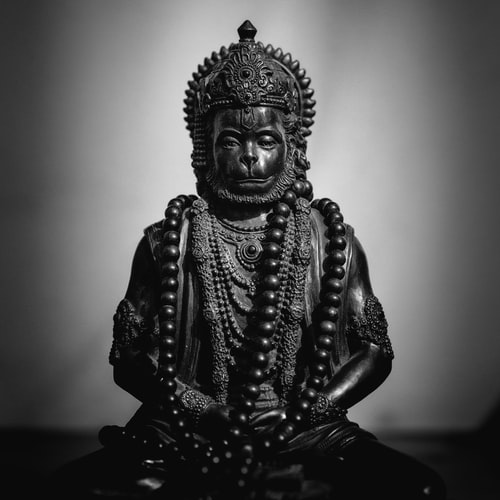
For example, let us take a person who says that stealing is bad, and it’s illegal after all. But, the moment they are in a position where they can steal without being caught, they may do so. In such a person, you can say that serving themselves and material benefits are higher values than respect for other people’s belongings.
Or, let us take a person who is very aggressive, and frequently get into verbal and physical fights. You could say that, for this person, having things go their way, and preserving their pride is a higher value than self preservation. On the other hand, a person who frequently avoids confrontation likely values self preservation more.
These values are the product of Culture (Chokmah, the ‘Father’). It is said that these values form in early childhood, and do not usually change once established. They can change, under extreme circumstances, but not so easily.
Now, let us take another hypothetical example. A person wakes up every morning, in the freezing cold, gets dressed and heads to college for an important class. What is this person’s value system? Well, we can ask: why go to college? Because I need to study. Why study? So I can get good marks. Why get good marks? So I can have a good career. Why is that important? So that I can make lots of money. Why? So I can have a decent life and family. Why? Because family is important for happiness.
And who says you need to be happy?
Well, there you might run into trouble. You might say: It feels good to be happy. But who says you should strive to feel good? Well, it’s human nature. Is it? But it’s also human nature to go to war, enforce your will on others, and manipulate people to do your bidding.
But those things are illegal. Okay, says who? Some made up book that some politicians wrote? But these laws create a prosperous society! Do they? Didn’t slavery and imperialism also create prosperous societies?
Um. Well. Because….because it’s wrong to do those things. Says who? The Universal declaration of Human rights! But who says that those are universal. God?
Yes. Think about how many constitutions say ‘all human beings are made equal before God.’
See, we can now create a value hierarchy for this individual. Working hard and getting good marks are the lowest values, and they build up. The higher values supersede the lowers values. For example, if the person realised that getting good marks would not land a good career, they may abandon their studies, which are a lower value, in pursuit of something that may land them a good career.
But as you go higher and higher, you realise that the highest value (be in love, peace, fulfillment, happiness) is taken to be self evident. Or rather, beyond the value system, certain self evident axioms have to simply be accepted.
For example, in most modern societies, the Highest Ideal contains axioms like ‘all human beings are equal’, ‘happiness is a good goal to pursue’, ‘pleasure is good’ and ‘pain should be avoided’. It is simply taken as axiomatic that acquiring wealth leads to happiness, that hard work and a good career lead to wealth creation, and that the work that one does should be honest. At least, until the 19th century, these were self evident axioms.
You’ll see that these axioms don’t really have a reasoning behind them. There’s no ‘reason’ why people should be equal, or that work should be honest, or that happiness is a worthwhile goal. These are things that just have to be accepted first, for every other value to function.
Do you understand now, why in ancient times religions were backed up simply by the phrase ‘God said so’. When Moses brought the Ten commandments to the Israelites, how did he justify them? Well, he said they came from God. When Christ spoke his sermon on the mound, when the Buddha denounced the caste system, when Gandhi insisted on self governance, when Washington proclaimed that certain truths are ‘self evident’, they were in reality saying that ‘God’ says so.

Eventually, you can no longer ask ‘Why’. ‘Why’ can take you deeper and deeper, until you suddenly realise that at the basis of society, of culture, of moral values and all religion, is just a set of axioms, justified by nothing. They have no reasoning, no higher axioms. This ‘Highest Ideal’, or God, is rarely ever consciously known. Rather, it dwells in the subconscious of all people, and guides all their actions, and often people of a society have the same ‘God’. This God is the child of Culture, which is the only thing which transcends it. Thus, Culture is our Father, and it was generated by Magick.
The Figureheads and Idols
Now, let’s go back to our little hypothetical shamanic tribe. Let’s say the healing herbs helped. Even after the shaman had passed, the people continued to ritualistically follow his instructions, and people no longer died of illnesses. Now the next shaman comes along, and she also does the inner work.
Remember in the last Great Secret post, we discussed how the work of magick frees the magician from their preconceived reality. The social and cultural norms imposed on them, and the world view they inherited are shed, and the magician becomes able to create their own reality? Well, this happens to the new shaman. By freeing herself from social conditioning, she begins to see, just like we just did, that a whole lot of things that the tribe does, are really kind of arbitrary and made up. The sacred colour, the healing rituals etc. don’t really have to be a certain way.
She also sees that people don’t die so often, and this has led to a significant growth of population and food in the tribe. You see, human beings don’t need much. In a sense, all they really need is to have pleasure in life, and a challenge to keep them going. In this tribe, fighting illnesses was once a challenge. Fetching the herbs was once a challenge. Growing enough food was a challenge. But these challenges don’t exist anymore. All this is easily accomplished, and things are beginning to stagnate. People grow dissatisfied and don’t have direction, and are edging to go to war with neighboring tribes.
So, she takes a journey up a mountain. It’s a hard journey. At the top, she comes to a place with great magickal power. Here is where she has her true initiation. After returning, she designates it as a ‘holy site’. And she tells the tribe that every year, at the day of their harvest, a pilgrimage must be made to this place. Then, some portion of the harvest, let’s say some barley, must be sacrificed. And of course, the precarious road up the mountain must be left hard and precarious, and no one should build houses close to the sacred spot. They should build a shrine there.
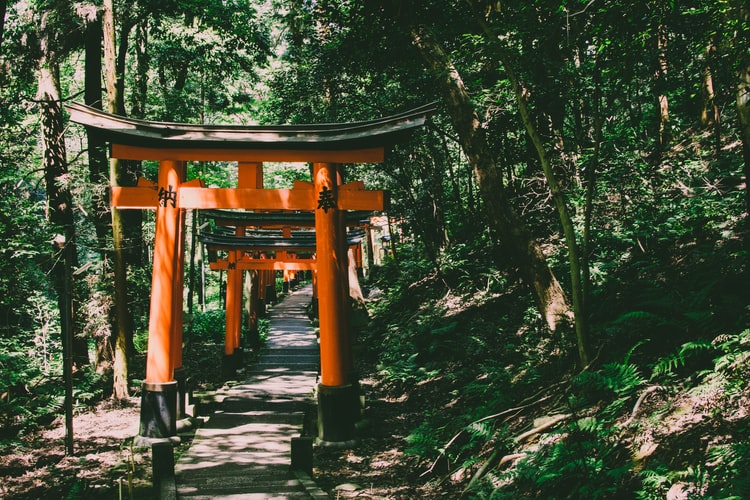
Now, the tribesmen and women ask: “but why”. Well, because Fire god said so! And after all, you wouldn’t want to piss off fire god, would you? In doing this, the shaman has created a new part of the culture. She has given the tribe something they can strive towards, some difficult task they must overcome. And, it takes them to a place of magickal power, where they can imbibe some of it, and do a ritual for a good harvest the following year. In a sense, you could say it’s made up. I’m sure this same ritual could be done within the village, but the point was to give people something to do, and learn from. A way to undertake a spiritual journey, to touch the Unknown.
Maybe another generation of shamans come along, and they say that all young men, upon reaching the age of 16, must go into the forest and slay a certain wild animal. Why? Well, to give them an experience of growing up. Instead of having them express their aggression at each other and getting bored, the tribe will create a way for them to have a little journey, to overcome a trial, to have a sense of accomplishment.
Maybe the next generation of shamans say that a certain, delicious wine can only be drunk on the full moon. Why? Well, moon god says so! And you wouldn’t want to piss off Moon god, would you? In a sense, this is just a made up restriction, but maybe it helps the tribe regulate their pleasure, and not descend into drunken savagery. By delaying gratification, they all are better off.
In this way, culture created and generated. You can say it’s made up. But in truth, it serves an important purpose. As long as people believe it, it will work for them. It will, over time, become part of the tribe’s Highest Ideal, their axiom. Maybe the tribe ends up a society where courage and bravery are encouraged, where people are happy to undertake hardships, and live in moderation. Their self evident axioms would be things like ‘bravery is good’ and ‘life should be lived in moderation’.
Over time, the ones who prepare the herbs become the priests. The beliefs and practices get codified, and institutionalized. As long as people have direction, purpose and a meaningful way to live, they will strive and prosper. This is the advantage of having a cohesive religion that everyone believes in.
But you can also see how essential it is that EVERYONE believes in it. Because, if even a single person radically challenges these notions, even a shaman, it really breaks everything. Suddenly, there is this terrifying possibility that what people believe did not come from the Gods, and are not self evident ideals. For example, maybe a young man refuses to slay the animal, because he feels killing an animal is wrong. Wait? But then, does that mean the ritual is wrong? Well, yeah. After all, going into the forest to kill an animal is not the only way to be brave. But then, why do it? Why be brave? Why do anything at all, if everything is just made up?
So, such transgressions would be limited. If somebody drinks the sacred liquor on any day but the Full moon, they need to do penance by undertaking the pilgrimage. It is essential for the society to function. Even the shamans, who recognize that much of this is made up, will not risk the collapse of the whole society.
But, rigid dogma and superstition are not conducive for magick. Eventually, such a society where everything is codified, where the Unknown has been banished from all aspects of life, will produce fewer shamans and magicians, and people will lose the ability to know themselves or undertake the inner journey. Those who do appear and start behaving in radical and different ways may be persecuted.
A thousand years later, the tribe has become a large kingdom. It is currently at war with a neighboring kingdom. You can go and ask the young soldiers, waiting in formation at the battlefield “why do you fight?”.
“Well, we fight for our Kingdom, to reclaim our sacred grove from the barbarians!”
“But who says you should do this?”
“The king of course!”
“But who says that he is King?”
“Why, the Gods of course!”
After all, the very possibility that the King is not special, that the grove is not special, would bring Chaos. Every soldier in the army will think “hey, this dude is King just because everyone listens to him, not because of Gods. So, if I was the most charismatic and got people to follow me, I could also be King?”
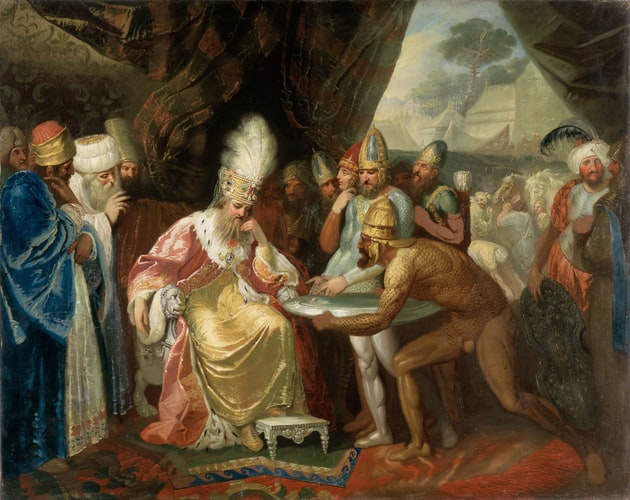
That would not do. So, everyone must continue to believe in their Gods and the religion. The King MUST be a special individual blessed by Gods! Because if he isn’t, everything just crumbles and falls apart.
Now another thousand years go by, and there’s no Gods, nor Shamans, nor Kings. The tribe, the Kingdom, is now a modern nation. Forced to continue what their forefather did, a special bus takes scores of devotees up the mountain every year to participate in a made up ritual. The road is bad, and busses frequently crash. The tiny shrine can’t handle so many people. But after all, fire god said that we can’t settle near the shrine! He said we can’t make roads up the mountain!
No one really eats barley, and devotees just buy some at the door, go inside, and burn it. Since farming is automated, there isn’t really a special harvest date. So instead they just fixed the date of pilgrimage. Perhaps on the day when that great King was born! The one who led the war to reclaim it!
But did the special grove get reclaimed? Nope. In fact, the two neighboring countries both own parts of it, and are perpetually fighting over who it belongs to. No one quite knows or remembers why it was sacred to begin with.
The wild animals are all dead, naturally. So, when young men turn 16, they have a special ceremony where the symbolically slay a little doll of the ancient wild beast, now mythologized beyond recognition. Maybe there’s a group of people who drink the special Full moon liquor on other days, and these people are hated and ostracized. How dare they! They must be evil, for they desecrate our ancient teachings and customs! They’re angering the Moon god!
And as science and cultural progress increase, people really start wondering if Moon God really said to not drink the special liquor. Or if the Moon god ever said anything at all. Or…if Moon God even exists.
Some devout people say that the ideals of bravery, moderation and gratitude were only made possible by ancient religious wisdom. Yet others ask, have these ideals not just become common place? Do we really need moon god and fire god to be brave, moderate and thankful? And yet others ask, as expected, why these things are even celebrated. After all, what reason is there to hold these ideals? Why not just give in to pleasure and cowardice?
Such a society would be confused and perpetually at war with itself.
End of an Age
Sometime in 100 AD, an Egyptian sailor named Thamus was travelling towards Italy, when suddenly he hard a divine voice:
Thamus, are you there? When you reach Palodes, take care to proclaim that the great god Pan is dead!”
And so he did so. Upon reaching the shore, he proclaimed “The great god Pan is dead!”. Pan, of course, was the Greek horned God or male fertility, of shepherds, or wild places. He was also the God of terror. In a sense, he was a God under the sign of Aries.
Don’t worry whether this event is true or not. This is a symbolic myth, and heralds the end of the Age of Aries. In little over 200 years, a fringe Jewish cult we now call Christianity would begin to sweep through the Roman empire. Similar things happened in other parts of the world too.
My own gnosis on the matter is that each astrological Age has a ‘God’, that is to say, a symbolic ideal. Not a specific deity, but rather an overarching theme which marks the thoughts and actions of the people who live under it. The end of every Astrological Age brings about the attainment, stagnation, and finally the death of this ideal.
In his book, Aion, Carl Jung proposes a similar theory, albeit without the spiritual trappings. He wrote that over time, the symbols of a society are ‘polished smooth’, and no longer have the same power or influence. For example, he said that in the Early Roman Empire, Greco-Roman polytheism had already become sterilised and meaningless. In my post on Indo Europeans, and also on Dionysus, I also touched upon this. These Gods were revived under the Roman banner one last time, but after that they lost their power. They just seemed like weird, fragmented cults. Meanwhile, Christianity, an extremely edgy religion centred around the worship of an apparently undead God from a distant land, whose followers venerated a symbol of torture, and drank his blood, dressed in dark robes and met in secret underground meeting halls, along with all the fiery and surreal imagery was apparently quite exciting!

A similar thing happened in the East too, with the spread of Buddhism, but that’s a story for another time.
Jung mentioned how, now it is Christianity which has become stale and stagnant, and people have begun to lose interest. But, we’re getting ahead of ourselves. Let’s go back, much further back.
Around the 17th-19th centuries, occultists had already caught on that the world was approaching such a scenario of collapse. In Europe, for example, Christianity had been the dominant religion for a long time. I mean, read occult grimoires from the middle ages, and you’ll see that even occultists who wrote on demonology considered themselves ‘Christian’.
You see, a society need to be uniform and have a set of common values which all members share. For example, the Caliphate in the Middle East, the caste system in India, the Church in Europe, the feudal systems of Japan, China and Korea’s ‘divine’ Emperors, East/ South Africa’s system of clans and tribes, and so on. All these things serve one purpose: to codify those ‘ideals’ we talked about. You could say each had it’s own version of ‘God’. Yes, these ‘Gods’ were similar, but not the same, and that does matter. As we discussed in the example above, these institutions needed to remain unchallenged. Because they were essentially backing up those axioms which a culture takes to be self evident. Without them, there is no divine justification for anything, and no objective meaning and purpose to life.
People may suffer, they may question their place in the world, they may resent their beliefs and doubt their morals, but they would be told that if they just lived as ‘good’ people and tolerated life, they would go to ‘paradise’ or at least have some reward during and after life. They were told that their religion and social norms were ‘correct’, and that their place in life was ‘fated’. Why? Well, because ‘God’ said so!!
In a sense, it saved the average person from having to question things. People rarely had much interaction with foreigners, and so they were sheltered from existential doubts. They could just be content and go on with their life. Unlike in the 21st century, the average peasant was never told he could be King, or should even try to. After all, the King was made by God’s decrees.
People would find peace and comfort by simply believing in their prescribed duties and self evident axioms, even occultists. And by the time the occultist had learned that these prescribed duties were meaningless, they already had the knowledge and wisdom to live without these. Hence why the Bhagavat Gita is so insistent that people follow their ‘prescribed duties’ and the caste system. The authors of this book likely knew that those who walk the spiritual path would eventually realise that the caste system was wrong. But, it still needed to remain for it formed the foundation of society, and gave early spiritual seekers a framework and a set of axioms. In a sense, it backed up the entirety of Hindu society.
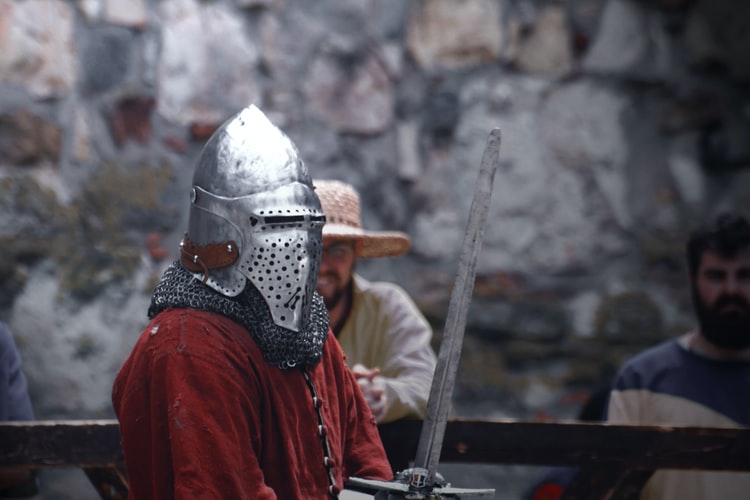
But these occultists saw the early warning signs. Maybe the protestant reformation was a warning sign. Suddenly, something so entrenched in European society as the Catholic Church was questioned and challenged. I mean, keep in mind that the Church was the sole justification behind most laws and the authority behind most crowns.
You see, many Magi in Europe had begun to see, and themselves doubt, the axioms laid out by Christianity. If the Church could lie, then couldn’t the Bible…also lie? But, without the Bible, what was to be the purpose of life? If living by Christian values and going to paradise was not the aim…then what was? What was the point of magick, if not to enter into Heaven, and to please God?
And so, these Magi, especially Rosicrucians, came up with an idea that was radical at the time (though to us it may seem obvious). They thought, what if the principles of Magick could be applied to create an ideal society?
A ‘Rosicrucian Kingdom’. A utopia. That old idea from Greece began to resurface. Basically, if there is no heaven, then we’ll create a heaven here. The purpose of life should be to create a world free of pain, sufferings and want. The aim of the magician should be to use their wisdom to make the world a better place! Let us call these guys, the ‘utopianists’.
You will see that, ironically, they also have a set of self evident Axioms which have no justification. Who says that society is even meant to be a perfect paradise free of suffering, pain and want? In reality, we have neither a reasoning nor evidence that humans can even attain a society like this. But the utopianists simply took these concepts to be self evident, and thus fell into the same trap that we discussed. They simply accepted the Christian ideals of ‘paradise’ and brought it into their utopia. Christianity without the God.
I find it amusing when atheists say things like “we don’t need religion to be moral!”. Um, what? Have you read a book on history? The fact is that even with religion, history is a bloodbath. In fact, made up religious tenets can be seen as pretty much the only thing keeping people even remotely moral. The fear that if they commit sins, then God will punish them. Atheists who say that it’s obvious what it means to be moral, have not thought through this stuff enough. It isn’t obvious, and it never was.
Keep in mind, that while 99.9% of you reading likely were conditioned into this utopian ideology in school, in the 17th century it was quite radical. It was never seen as a natural part of life or an aim of magicians to ‘build the ideal society’. Most people believed that suffering was simply a part of life, something you had to do before going to paradise.
And so, some interesting new changes happened.
As some of you may know, John Dee created the Enochian system of Magick with Edward Kelly in Prague, when it was ruled by King Rudolf II. Rudolf II was a huge patron of Magick and the esoteric arts, and so during his reign magicians, alchemists, witches, mystics, Kabbalists and all sorts of other eccentric folk flocked to Prague.
Prague is a unique city. It was created by an ancient meteorite, and is ringed by 7 hills. The churches and synagogues of the city form a pentagram (sort of). It also had a significant Jewish population and had been home to many Kabbalists in the past. In a sense, it was the perfect place to start the Rosicrucian Kingdom!
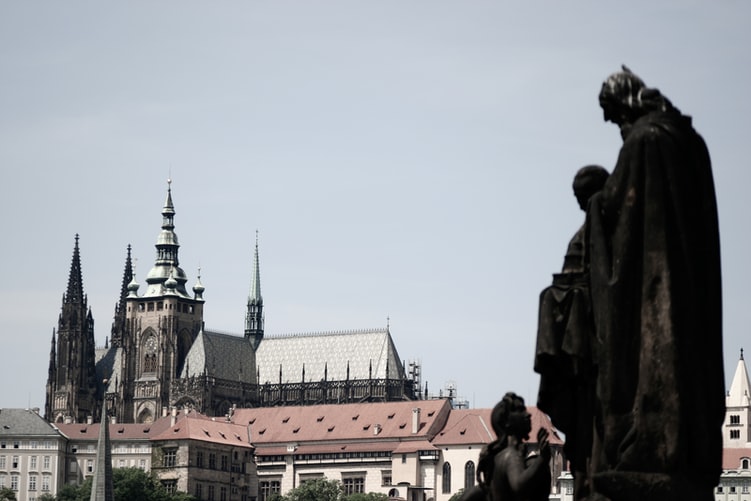
Now, things did not quite turn out that way, as some of you probably know. This idea of an occult Kingdom, filled with heretics and those who practiced the ‘black arts’ terrified the rest of Christian Europe. Catholics and Protestants together descended upon Prague, and the city was sacked. Rudolf was killed, and many books of magick were burnt. The dream of the Rosicrucian Kingdom died. That’s a story for another time. However, the utopianist ideal lived on. One day, it would return to the world in the form of socialism, liberalism and progressivism.
Now, there was another group. These are people I’m sure you know well.
This group of occultists, whom we will call ‘tribalists’ asked “why not just return to our ‘natural state’. Meaning, why believe in abstractions, and why not just take science and rationalism as the self evident truth, the transcendent ideal.
In that case, the only rational and objective ‘community’ you belong to, is one based on blood. In other words, ‘race’. And the only rational and scientific purpose of our life should be to preserve ourselves and our group, and oppress everyone else. Basically, the whole ‘might is right’ philosophy. Many of you pagans and satanists might be amused to know that neo-paganism and a desire to return to shamanic religion was originally a traditionalist, anti-progressive sentiment.
In Europe, Christianity came to be seen as a ‘foreign’, ‘Jewish’ and ‘socialist’ religion, and people instead began to ask why not just divide humanity on the basis of ethnic groups, and every ethnic groups should just be left on their own to worship ‘their’ ancestral deities, live on their ancestral land and compete with other groups. Ethnocentrism, and survival of the fittest as the highest ideal. They wished to practice eugenics to strengthen the race. Without a divinely ordained morality, the idea that the individual matters more than the group suddenly felt rather random and arbitrary.
Interestingly, anti-colonial movements in India, Africa and the Middle East were also built on this ideal. Later on, fascists in Europe would come to be inspired by religions like Hinduism.
Many Hindus don’t realise this, but the fascists did not have much interest in Hinduism per se. Rather, they wanted to use it as a framework. Hinduism at this time was strongly entrenched in racial, caste and tribal boundaries. To many, this seemed like the only ‘scientific’ and ‘real’ way to live. Now, these ideologies, since they were so antithetical to the general morality of the time, never quite caught on. But they did live on until they finally emerged again as fascism, nationalism, traditionalism and volkism.
Many neopagan and satanic occult groups started out this way. Theosophy is largely reliant on the idea of race and racialism, although it was not racist itself. Now perhaps you understand why so many works of magick from the late 19th and early 20th century mention race so often, and are so obsessed with race, even in the Golden Dawn and Thelema. For them, race and blood was the only ‘real’ and transcendent ideal.
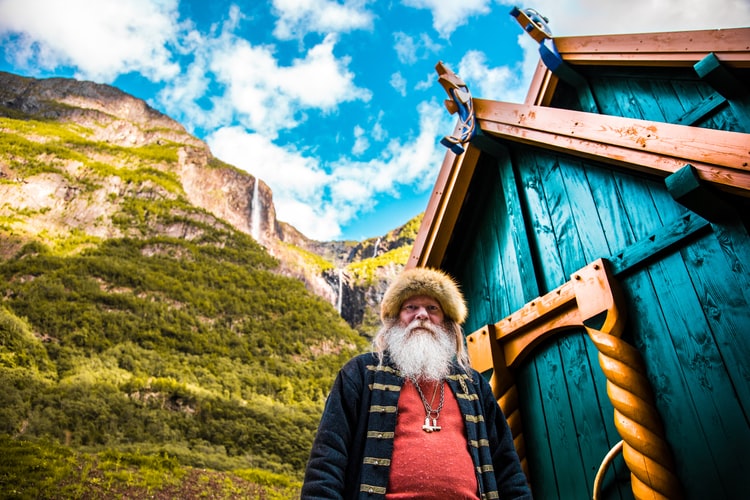
If you really think about it, you’ll see that any and all attempts at creating a scientific morality inevitably lead to this. Even moderate nationalism, in truth, is based on this idea. The idea that self preservation and general happiness of the race is greater than that of humanity. Meanwhile, utopianism is the opposite, that human progress and material success matter more than any blood ties. Ironically, the ‘humanist’ view denounces natural human tendency, and the ‘rational’ view would denounce scientific progress.
The Death of God
Occultists may have realised what was happening, but people weren’t quite there yet. In most parts of the world, religion was still widely followed and believed in. Everyone was enthusiastic about science, rationalism and social progress. No one could even imagine what the coming century would bring.
“God if dead, and we have killed him”
So wrote the late 19th century German philosopher Friedriche Nietzsche. While today Nietzsche’s writings are well known and popular around the world, no one took him seriously when he was alive. Maybe people thought he was just an edgy atheist or an anti-authoritarian.
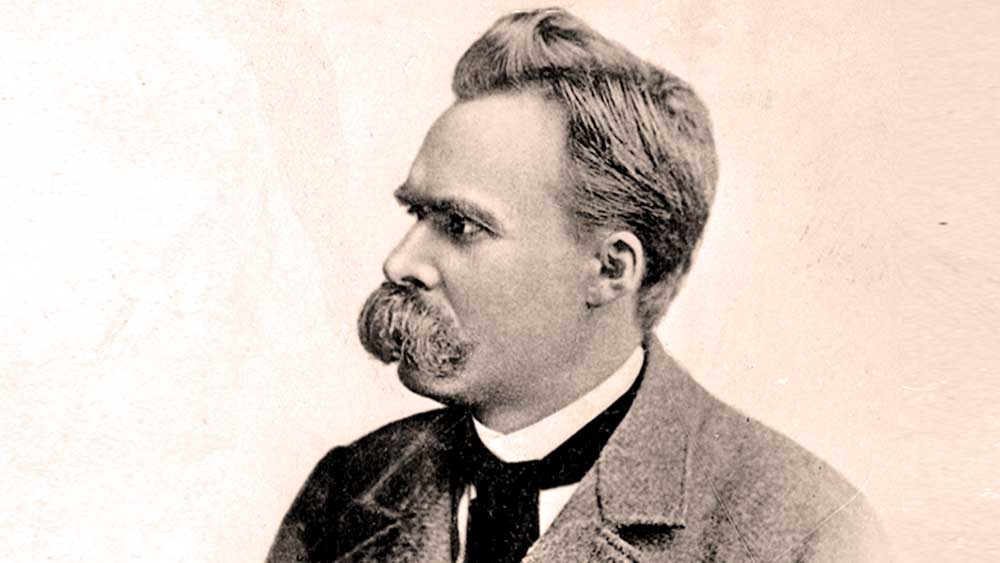
Look at just how long this blog post has been, and how much time it took to get everyone reading on the same page. Many people, even now, misunderstand Nietzsche. Some people think he was a right wing traditionalist who was denouncing modernism. This is untrue. Fascists in Italy and Germany interpreted his work a certain way, but anyone who reads him will realise that this is nonsense.
Some others think he was celebrating atheism and rationalism, but this is also untrue. When Nietzsche said “God is dead”, it was not a celebration, but a dire warning. You see, Nietzsche realised what was coming. He saw that increasing scientific and cultural progress had laid bare, very evidently, that many of the religious truths that the West was built upon, namely those of Christianity, and even Greece and Rome, were untrue. By this time, it was well known that the Bible was not literally true, and likely not the Quran or any other holy scripture. It was evident that many social norms and feudal systems around the world were flawed and arbitrary Even the idea of royalty, gender roles, and in fact all the self evident axioms on which the world was built.
To be clear, Nietzsche was not criticisng scientific and cultural progress. If he did that, the answer would be easy. No, he saw them as inevitable. Certain institutions and beliefs which had allowed humanity to build stable societies, and then enabled scientific and cultural development. But, this very progress, this unprecedented growth of Order and the shrinking Unknown, would lead to the destruction of those very institutions and beliefs.
In the time Nietzsche spent thinking, he independently arrived at the same conclusions we have seen in this article. Naturally, this caused him to enter into long, depressive periods and probably have several mental breakdowns. The realisation that life, in truth, had no purpose, and that all the fundamental values and beliefs we cling to are, mostly, just made up, was a horrifying realisation. It was perhaps the first time in the modern era that an ordinary person, who was not a magician, realised this and made it publicly known.
He predicted that eventually, ideology would fill that hole left by religion. And it did, in the form of communism, fascism, nationalism and capitalism. In fact, it was Nietzsche who first called Socialism, “Christianity without the God”, and also came up with this idea that Christianity, and Religion itself created a ‘slave morality’.
You see, he saw a very serious problem. Without God, or a transcendent ideal, who was to justify the moral system of these ideologies? What standard was there to act as an anchor, to stop these various ideologies from just going haywire, and turning into dictatorships? And that is precisely what happened. Some group of people who have the most power, influence and charisma dictate what the ideals of these movements are. And then it’s nothing but a power struggle, as the old culture and institutions are torn down, without meaningful replacements ready. What took thousands of years to evolve cannot simply be replaced overnight. All it breeds, is more revolution.
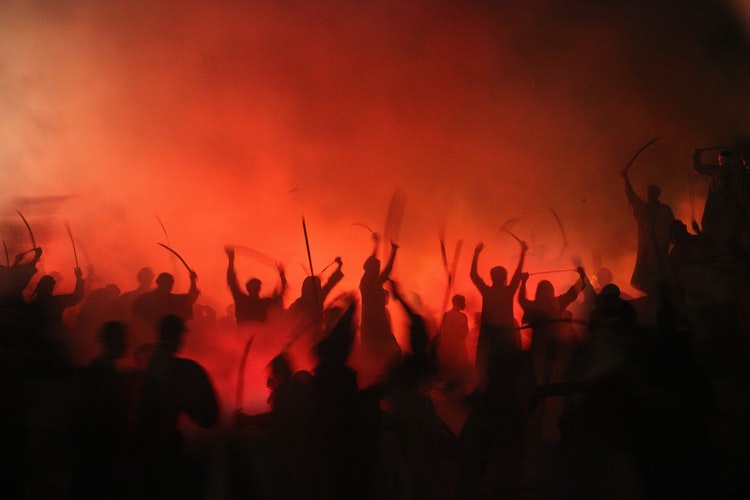
The failure of both fascism, and marxism has now left us with nothing except capitalism. In my post about the Age of Pisces, I explained how this represents the spiritual fading away of the Piscean age.
You see, capitalism is not a bad economic theory. Yes it has problems, but the fundamental idea that there should be a free market where people voluntarily trade in goods and services is quite decent. The problem is that that’s all capitalism is. It does not work as a moral philosophy (consumerism) and a political system (corporatism).
A lot of people who denounce capitalism these days are, in reality, alienated by our consumerism and corporatism. Money and material wealth have become the transcendent ideal. In a sense, even modern socialists and nationalists are really just consumerists.
For example, let’s say a nationalist wants their country to prosper. By ‘prosperity’, they probably mean economic growth and material progress. If a socialist wants equality, they likely define ‘equality’ as economic equality. As everyone having a job and a living wage. It’s interesting how, money and material wealth have become the be all and end all. The source behind wars, ideological conflict, and even the only thing on people’s minds. All our new technological advancements are used for nothing more than a way for corporations to sell us more shit.
It was Peter J. Carroll, a Chaos magician, who introduced the words “consumer capitalism” and “consumer communism” in his 1980 book called Liber Null. To him, ideology itself has become a commodity. He predicted the coming age of Aquarius, and how people would lose faith in consumerism and corporatism.
It’s like a market place of “isms”, of labels and ideologies which has replaced our religious systems. All ideas which all claim to have “facts” on their side, promising a utopia , if only the ‘good’ people would just deal with whichever group or thing has been deemed to be ‘the problem’. Not too different from medieval priests telling peasants to go burn the heretics, whose activities had apparently the source of bad harvests or strange diseases, who claimed to have ‘God’ and ‘divine decree’ on their side.
Back then God sat up in the sky. Then we went and looked, and he wasn’t there. Then he was sitting in the far future, in some promised utopia. Then we went and looked and he wasn’t there either.
Now people begin to ask “Where is our God! He must be dead! And those people must have killed him!”
Even nihilists blame someone for their nihilism. And today most people are either some form of nihilist (even unconsciously), or believe in various utopias (unconsciously). Maybe you’re a banker, but you hate your job, but you think that the sufferings is worth it because some day, you’ll magically have enough money to feel ‘happy’. Maybe you’re a teenager who thinks life is meaningless, but you think raging and rebelling against ‘society’ is the answer, even though you’re part of society. Maybe you’re a Christian, still desperately clinging to the idea that the Bible isn’t just a book, and Christ will descend from heaven and fix everything, that you’ll go to a promised paradise.
Maybe you’re an occultist, who thinks it is only a matter of time before the Age of Aquarius is in full swing and there will be some ‘mass awakening’ where human beings shall suddenly become more enlightened and evolve. Even though, no one ever said so. We simply choose to believe it. Maybe you think that if you just keep doing magick and tolerating whatever miseries or sorrows you have in life, suddenly there will be a light in the sky and archangels will descend. Maybe you think if you just do the LBRP every day, suddenly there will come a day where you will become free from the pains and hardships of life, and have the ability to fulfill any desires without consequences, where the Gods shall suddenly show themselves to you and all shall be well forever. The politicains will stop lying, the wars will stop, everyone shall embrace magick and there shall be good jobs for everyone. Just….just a matter of time now. Any day…
Is that any more naive than the Christian, the Jew, the Muslim, the Hindu or the Buddhist waiting for promised redemption?
Now, let us try to find a solution.
The Will to Power
Nietzsche was truly ahead of his time. Unlike many other philosophers, he did not bother playing around with ideologies, new religions or scientific rationalism. Instead he went straight to the question: How do we deal with the death of God?
In other words, he started solving the problem of the 21st century in the 19th century.
The commonly given answers, ie returning to religion and believing in science, do not work. Religion, while containing wisdom, can no longer serve as the transcendent ideal, due to the lack of absolute axioms. The fact that these days we have to reconcile religion with modern values and science proves this. A truly divine thing would need neither to be reconciled nor justified.
Then the problem of science. Science tells us how the world is, objectively. It does not tell us how to live, what to aim at, and what our purpose is. Yeah yeah, scientists can harp on all about how “one day” we’ll know. But the fact is, the average 18 year old cannot look to rationalism or science to tell him what he should do with life, or a father how he should raise his children. As we saw in a previous post, it cannot even reliably tell us what we should eat. Now, one answer it could give is that all humanity should simply engage in science. In a way, turn scientific progress itself into the transcendent ideal. Humanity should just devote it’s whole effort to learning more about the Universe. This is an absurdity.
As for now, we have reached the limit. The next frontier, which is space, is out of reach. Most people alive right now will not go to space, and even by the end of the century we can only expect a few research colonies.
Our short lifespans and inability to travel close to the speed of light hinders us. In a way, the ‘Known’ has expanded and encompassed everything on the planet. With a simple google search, you can have 99% of phenomena on Earth explained, view scenes and images from any place, and communicate with anyone anywhere. Yes, there are unexplored jungles, but how many of us will realistically explore unknown forests, dive deep into the ocean or go into space? The unknown is now beyond the reach of most humanity.
And yet these rationalists have created a mentally ill society by telling everyone that the only meaningful path is to push even further. Hence, everyone wants to be an entrepreneur, an explorer, to create an AI, a VR experience, to be an activist, a celebrity or a billionaire. Everyone wants to change the world. The naturally slow pace of science drives people into pseudo-scientific cults like the Flat Earth Society just to find answers, while the rest run off into the fantastical land of video games, comics and films, just to find some sense of novelty and adventure. We have an entire world of dissatisfied people who are unhappy with their ‘mundane’ lives, and want all those exciting opportunities which are few, and can only go to some.
After a lifetime of thought, Nietzsche produced his magnum opus, the philosophy called Will to Power. It was a message for the time we currently live in, and thus has grown quite popular. But it is a frequently misunderstood idea.
Will to power is an idea as powerful as it is depressing. Nietzsche, rejects both free will and determinism. He rejects both hard atheism and religion. And, he rejects both tribalism and utopianism, since he saw how they were rather arbitrary.
Rejecting the idea of ‘survival of the fittest’, he elevated it to ‘Power to the Fittest’. Basically, he purported that all things in the Universe are driven by one transcendent principle: the Will to Power. That is to say, the Will to increase relative power. To not just survive, but thrive, and expand influence, and overpower. Life, according to him, is simply one case of the Will to Power, and human beings are also primarily motivated by this.
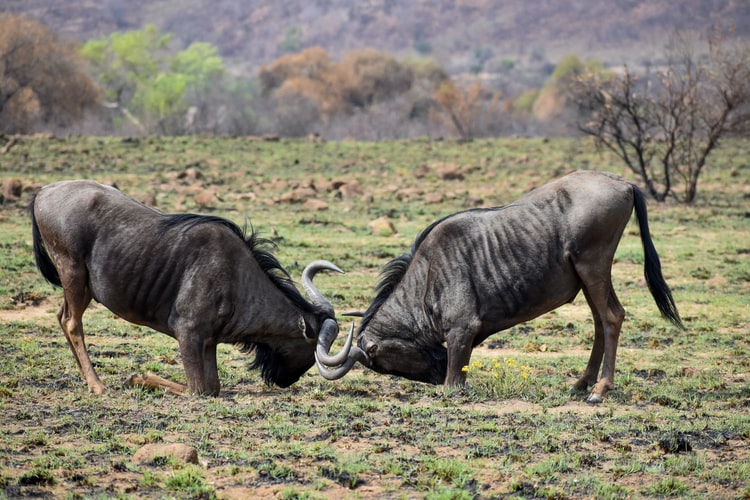
Out there in the Universe, where two stars come close together, what happens? Their gravitational pulls naturally compete, until one consumes the other, or locks it into orbit.
In our solar system, Planets formed as a result of larger rocks overcoming and consuming smaller rocks. Human beings evolved to where we are through warfare, competition and by actively dominating and integrating other homonid species, and by actively changing the environment.
The Will to Power, therefore, states that all forces in the Universe are really the Will to Power. And this force competes with itself, force against force, Will against Will, to increase it’s power and domination. Every single thing is driven towards the expansion of its power, influence and sphere of control.
You will see that this fits into the shaman story we started with. By entering into the forest, the Shaman was driven by the Will to Power. After all, the expansion of knowledge leads to the expansion of the Shaman’s power. By learning to heal, he can not only increase his own lifespan, but also gain an elevated position over his peers. Learning to make medicine can allow the tribe to be healthier and have longer lifespans, and this gives them an advantage over other tribes.
By adhering to ancient wisdom, the society maintains its relative ascendance. When a society collectively ostracizes a ‘heretic’, it’s only because the heretic threatens the status quo which reduces the power of the society, and also threatens those who hold most of this power. Two kingdoms fight over a land not merely because of superstition, but because of the innate desire to dominate, subjugate and overpower the other, thereby increasing it’s power and that of it’s subjects. People fight for some King because, by increasing his power, they increase the power of their kingdom and also of themselves. People choose to believe in religious dogma because there is strength in numbers, and by forming themselves into a community, their relative power grows. After all, a religious community fanatically devoted to their cause is more powerful than an individual can ever be.
If today people denounce religion in our society, it’s because it no longer empowers and serves people. In reality, people come to new traditions of magick and spirituality not because they seek ‘truth’, but because it grows their power. Spiritual traditions spread their teachings because it increases their influence and wealth.
Even this blog could be seen as a manifestation of my own Will to Power, to increase my influence by spreading my ideas to the world. You read it because the knowledge will increase your quality of life, and ability to control, dominate and change your life and circumstances.
All this likely sounds bleak, but I want you to really consider the implications of the Will to Power. It is an inescapable truth, even if not transcendent, it is profound. War is Will to Power. Politics is Will to Power. Rebellions and Dictatorship alike are Will to Power. Romance, Education, Travel, Spirituality are this Will to Power. Evolution itself, and Scientific progress are Will to Power. Natural disasters, the motion of stars, the galactic swirling, entropy and gravity are this Will to Power. Life simply is Will to Power.

J.R.R. Tolkien famously took on Nietzsche (being himself a devout Catholic). In the Lord of the Rings, Sauron’s Ring is defined as the ‘will to power’ itself. Tolkien was taking an obvious jab. His aim was to show Sauron as following the Will to Power, and thus being cruel and tyrannical, and how the Fellowship of the Ring overcame his power through friendship, loyalty, humility and mercy.
And yet, Tolkien only went ahead and proved Nietzsche’s point. For you see, ‘Power’ in Will to Power is not just being described as strength, military capacity or wealth. No, power is anything that helps you overcome your foes. So, according to Nietzsche, humility, mercy, tolerance, generosity and loyalty are also forms of ‘power’. According to this philosophy, the people of Middle Earth only succeeded because these traits increased their Power. By being merciful humble, loyal, brave and honorable, they were able to overpower Sauron.
All Tolkien proved is that these traits are more powerful than domineering strength and a numerical advantage. All it shows is that the Elves, Dwarves and Humans had a stronger, and more ‘powerful’ form of government and social ties than the orcs of Mordor. Sam and Frodo succeeded not because friendship is ‘good’, but only because in that specific instance friendship and loyalty were more powerful than fear and deceit. Sauron did not fail because he was ‘evil’, but because he was weaker.
That is the inescapable idea of Will to Power.
For even a noble, generous man who shares his immense wealth and genuinely loves his enemies and genuinely wants the best for mankind, does so because such traits are seen as ‘good’ by the human race and increase his relative power. That is not all, of course. There is something greater, but that’s what these posts are working towards. The existence of a Higher Ideal does not invalidate the Will to Power.
The Sacred Masculine
To many of you, that probably sounds pretty damn bleak. It makes everything seem so…futile.
I mean, power? Really? The entirety of existence is really just driven by Wills competing for power? What about love? Do you really just love your parents because it has social utility and evolutionary advantage? Do you really put time into your passion because it enables you to grow your influence and power? Do you really just do magick to ascend over others?
Will to Power is almost certainly real, but it’s doubtful is it is the transcendent ideal. Nietzsche, it seems, had a similar problem, being unable to find satisfaction in his answer. So, he came up with another idea: the Ubermensch.
The Ubermensch means the “over man” or, quite literally, “super man”.
Nietzsche felt that the Will to Power was basically an ‘natural’ state of being, and that evolution itself had caused human beings to possess it. But, unlike many of the ‘blind’ forces in the Universe, human beings had also evolved reason. We developed the ability to break away from our natural, animalistic state and create artificial ways of being.
A lot of people casually use the term Ubermensch, not actually understanding what it means. In Nietzsche’s understanding, it was the eventual goal of human evolution. He thought that, over time, a new kind of human would emerge, who would be able to transcend their inherited value system. And thus, this highly evolved creature would be able to ‘create’ their own values, completely independently.
Think back now, to the previous Secret of Magick post. Do you remember what we discussed? How magick causes a process of spiritual transformation that eventually causes the practitioner break away from their inherited reality, and create their own reality. By being able to redefine their psyche, they become able to redefine their own value system, and develop a new, personal morality.
This is the Ubermensch, the being who creates their own reality and their own values. The being who is not bound by anything, but instead binds the forces of their psyche to their Will.

What Nietzsche believed would emerge out of human evolution, is already attainable through spiritual evolution within the individual. It is the destiny of the Magician to make themselves the Ubermensch.
You can see this paralleled in myths of Armageddon. As you all know, the story of Christ being resurrected represents the Initiation of the student. The individual dies, symbolically, and is reborn. Christ is the ‘Self’. But then, what does the story of Revelation symbolise?
It represents Christ returning to the World to destroy it, and redeem the fallen. In reality, it represents the Crossing of the Abyss, when all those symbols which unconsciously governed us as cast away, such as morality, laws, religion, culture, passions etc. It is when our perception of reality, our ‘Universe’ is destroyed, and the contents of the psyche all reveal themselves and stand before the Self for judgement. This is also represented by the Kalki Avatar, Horus the Avenger, and Ragnarok. All this these myths of destruction really just show the destruction of the psyche, and redemption of all aspects of oneself. Beyond this, the ascended magi is free to define reality as they Will. However, this is not a singular event, but actually a lifelong process.
The Will is Masculine. Order is Masculine. Therefore, the Will to Power, to confront the Unknown and create Order from it is the impulse of the Sacred masculine. This very act or creating order from chaos is magick, and invokes the Sacred Masculine. It manifests to us as Culture, the Divine Father, for when we confront the Unknown, we generally rely upon our ‘culture’ to make sense of it.
In the most crude sense, this is why when an ancient culture overcame the other in combat, they sought to impose their own culture onto it, and why humanity was always driven to expand it’s sphere of control, and various cultures wanted to spread their philosophy, religion and ways of life. This is also an aspect of the Will to Power.
As we discussed in the last post, Religion (which is born out of culture) gives us a framework to practice spirituality. Magick, too, can be done within this framework. However, as a shaman generates culture, the practice of magick eventually enables the student of magick to become like the Ubermensch, and generate their own culture and value hairarchy.
For example, let us say you practice witchcraft, or hermeticism, or even thelema and satanism.
Perhaps you do the LBRP everyday. Tell me, hasn’t the LBRP, and it’s symbols become a part of your own, personal ‘culture’. The fact is that ordinary people, even in the West, do not normally do the LBRP, or use the Pentagram and Cross the way we do, or look at the world through our alchemical and kabbalistic framworks.
Even as you read right now, Hermeticism, Neopaganism, Daoism, Yoga and a few other traditions are spreading like wildfire across the world, preached and practiced by spiritualists, literally creating a bran new, novel culture.
For thousands of individuals in the world, as the old ‘God’ dies, and new ‘God’ is coming into being, which will produce a new set of ideals. And the Father, or Culture, producing this God is a conglomeration of various popular magickal traditions. We have become like the new shamans, going into the Unknown and bringing back wisdom.
In a weird sort of way, we magicians of the 21st century all belong to a bunch of brand new cultures, which slowly assimilate through our interactions and exchange of knowledge. Some of you may have a completely unique magickal system of your own making, which means you basically have a culture that you, and only you, adhere to. Over time, these WILL bleed into mainstream awareness, either through external means (such as this blog), or internal means (simply spreading through the collective unconscious). I mean, was the Pentagram as common or mainstream a symbol just 100 years ago as it is now?
Right now, there are people reading this blog from all parts of the world. Some of you may be Western, some African, some Asian and some Indian. Some of you may be Christian, some Hindu, some Pagan. And yet, none of the contents of this blog, or any other similar blog or youtube channel, are part of mainstream culture. I can casually reference things like the LBRP, which to the average person are totally unknown. Tell me them, isn’t all this really just a set of new cultures which are emerging? Aren’t you really just becoming members of a new culture, shared currently by only a small number of people, but rapidly growing? A culture originating in the Golden Dawn, in Thelema, in Neo-Vedanta, in Technological spirituality, in Psychadelics, in Satanism, in Neo-Paganism, in Gnosticism, in UFO cults, in Cryptids, in Cosmic religion and Interstellar imagery!
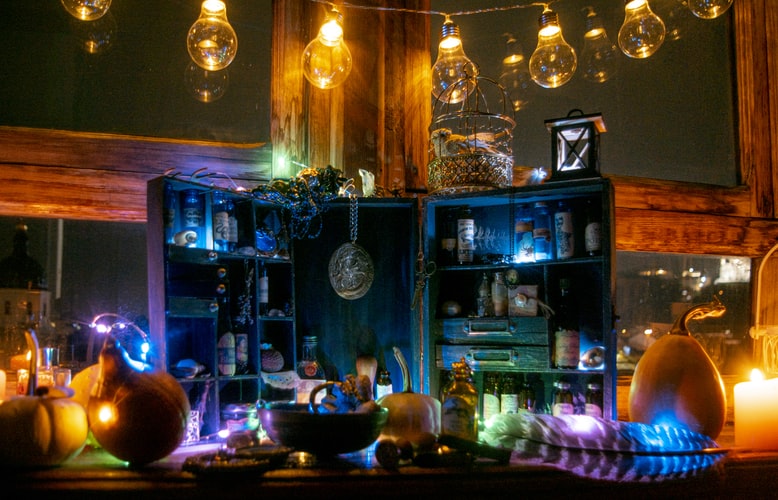
Perhaps, 200 years from now, children in schools will read the LBRP as a daily prayer. Maybe there were be Churches and Temples which venerate the Pentagram. Maybe the Hermetic Laws will be widely and commonly believed in. You already see mainstream people believing in things like “the law of attraction” and “synchronicity”.
God is dead, and we killed him. But now from the womb of our own minds, a new God is being born, who shall guide us into the future. Therefore, pray and work. Follow your impulse, your drive, and your Will. Do not despair, or allow those who spread fear, hopelessness and despair to confuse you. If we are living in a time of upheaval, it is only because the Unknown has entered into our bastions of civilisation and culture, which are now ridden with holes. But, this is precisely when magicians thrive.
Like Ra, the Solar Father, who raised the first Obelisk from the chaotic waters of Nu, so too can we do so in our own lives, collectively and individually.
Next time, we shall look at the Divine Feminine, instead 🙂
Until Next Time
White Raven Invictus
